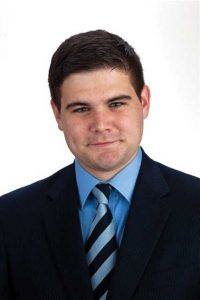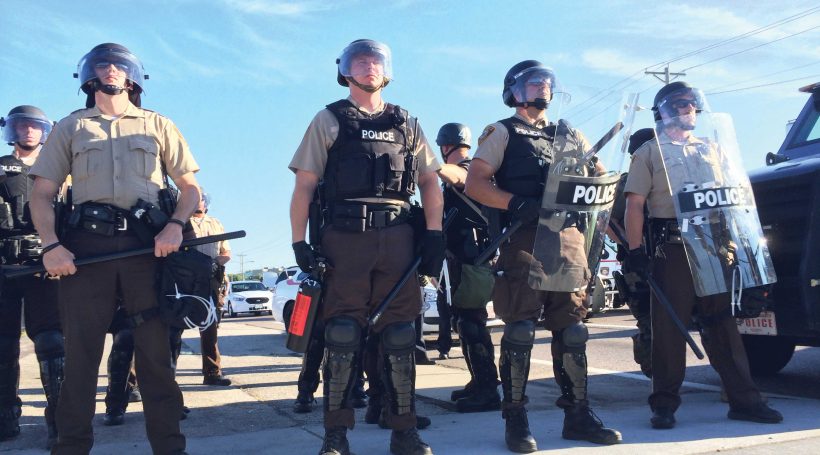Of all the headlines about the unrest in Ferguson, Mo., this summer, perhaps the oddest told of two journalists who were arrested in a McDonald’s. The experience was jolting for both reporters, especially Marlton’s Ryan Reilly, who was there on assignment for The Huffington Post.

Ryan Reilly
Reilly was assigned to cover the protests that followed the death of 18-year-old Michael Brown. Reilly was in Ferguson less than 24 hours when he and another reporter, Wesley Lowery of “The Washington Post,” were taken into custody. Reilly says that earlier that August evening he had attended a peaceful protest, and he hadn’t seen any violence. He was, however, shocked at the level of security.
“What really heightened the situation and antagonized the crowd was when [the police] brought in what looked like military vehicles,” Reilly says. “It was such an overreach. It was such a display of force that seemed completely unnecessary for what was happening on the streets at that time.”
After covering the protests throughout the afternoon, Reilly and his colleague from The Huffington Post, Christine Conetta, decided she would continue to film footage of the police presence on the streets while Reilly would retreat to the nearby McDonald’s to begin writing.
Reilly and Lowery were both working from the McDonald’s when Reilly says he looked outside “to see this line of officers walking down the street. They talked to the manager of the McDonald’s and they yelled out that we would be allowed to stay, but they couldn’t guarantee our safety. They commented that 911 wouldn’t respond to any calls.”
Reilly continued to take photos of the police, which attracted the attention of one of the officers. The officer asked Reilly for photo identification, which he refused to provide. “I was sitting in McDonald’s and should be treated like any other customer would be treated,” Reilly says. “You’re allowed to take photographs of the police, and I was not suspected of any criminal wrongdoing, so there was no reason for me to show it. Obviously he wasn’t too happy with that.”
The officers left, but returned a moment later, demanding that the patrons leave the McDonald’s. Reilly says the police began a countdown.
“Wes and I had all our materials spread out,” Reilly explains. “I had two laptops, both charging. Both of my phones were charging. A lot of cords going everywhere. So they were giving us this countdown, and I was trying to do a bit of filming. That’s when the officer sort of got up in my face.”
Reilly says he started packing and trying to explain that he was a member of the press reporting on the situation. “At one point, the officer grabbed my stuff and started shoving it in my bag. I said, ‘I didn’t give you permission to touch my personal property.’”
It was a confusing, hectic moment. Reilly says he saw Lowery being arrested, and he knew it wouldn’t be long before he too was placed under arrest. Reilly was shocked – mostly because he didn’t know what he was being arrested for.
“What they told us initially was that we weren’t packing up our bags quickly enough,” he says. “They threw out a bunch of reasons – trespassing, some sort of made up charge.
“One officer from the St. Louis County Police Department hit a pressure point on my neck, and I wasn’t resisting,” Reilly says. “You always see these clips with the officers saying ‘Stop resisting, stop resisting!’ Apparently, at least with these officers, they just yell that no matter what. I never put up any sort of fight. I let my hands go. My hands were behind my back, and I wasn’t resisting in any way.”
As he was being escorted out of the restaurant, Reilly says he called out to the shell-shocked McDonald’s employees, asking them to get out the word that he had been arrested. Reilly says he was spelling his name for the employees when the officer who was arresting him grabbed the back of his neck and slammed Reilly’s head into the door of the McDonald’s. “Then,” Reilly says, “he said sarcastically, ‘Oh, I’m sorry, I apologize.’”
Once outside and reunited with Lowery, Reilly tried to regain his cool.
“Having someone there going through the experience with me calmed me a little bit,” he says. “That’s when we switched from the shock mentality to trying to get the information we were entitled to.” The reporters asked for the names and badge numbers of the officers, but didn’t get a response. None of the officers were wearing nametags.
“I think that’s one of the biggest problems they’ve had with law enforcement down there,” Reilly says, adding that he never found out the identity of the officer who allegedly assaulted him. “I understand there are some potential security concerns, but when you have this anonymous police force using really rough brutal tactics with impunity, it’s a recipe for disaster.”
Reilly’s first phone call from jail was to his wife. She didn’t have her phone (“Something she’s never going to live down,” Reilly says with a chuckle), so he called his father Joe, who lives in Medford, and asked him to tweet that Reilly had been arrested. “I don’t think that’s normally what people do with their phone call from jail,” he laughs.
Without any substantial charges, the reporters were released in less than an hour, and both returned to covering the protests. “It was an extraordinary experience,” Reilly says. “And one that I think opened doors for me in Ferguson, because people recognized me from what I had gone through.”
Reilly spent the next several weeks in Ferguson, talking to people and covering the protests on a nightly basis. He says he had never covered anything quite like this story before – the closest he could think of was his experience covering military commissions at Guantanamo Bay.
After the harrowing experience on his first day in Ferguson, Reilly says he felt a little safer with the crowds of protesters than he did with the police – at least at first.
“It was a weird environment there on a few nights, almost a party scene,” he says. “I saw one car with 14 people piled on top of the roof. A lot of people were drinking and smoking on the street. But there was a little bit of self-policing going on, which was interesting. You saw some people directing traffic and making sure people stayed out of the street.” But on nights when people in the crowd started looting or became violent, Reilly says he was glad to be allowed behind the police line.
“I was scared during certain times,” he says. “One time we were down the street talking to people, and tear gas separated us from the press area. I saw an 8-year-old who had gotten hit and was really struggling. Tear gas isn’t fun. It’s really painful. It hurts your eyes, it hurts your throat.”
But it wasn’t all violence. In his reporting, Reilly came across people who wanted to show another side of Ferguson. “There’s a lot of good people there; people who care about their community,” he says. He recalls meeting a teacher at the public library who volunteered to watch the children who were supposed to be in school that week. “She apologized for what happened to me,” Reilly says. “The idea that someone who’s in the midst of trying to take care of all these kids stopped to ask me how I was doing was amazing.”
Though his arrest stole the headlines, Reilly says the most important part of his work was doing what he was sent to Ferguson to do: give the voiceless a platform to speak.
“Regardless of the outcome of the Brown case specifically, I think there’s going to be reform in that area leading out of this,” he says. “And it’s because of those voices.”












